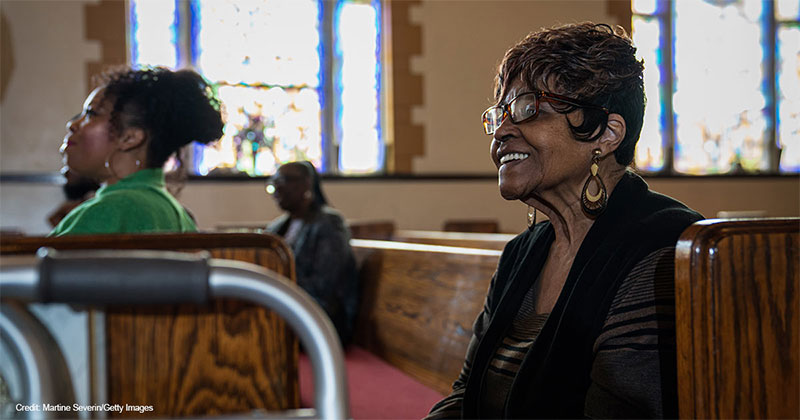
Although U.S. church attendance has fallen to historic lows, the faithful still congregating have found a new source of optimism and pride in America’s sanctuaries, a new poll finds.
Though fewer Americans darken a church door or believe in God, nearly all those who do say they believe their faith has a bright future and have few qualms identifying with their church in the public square. The left-leaning Public Religion Research Institute (PRRI) interviewed 5,872 people last April through August, asking them about their religious views and participation. The results, published May 16 in a study titled “Religion and Congregations in a Time of Social and Political Upheaval,” reported a mix of results that nearly all came out positive for those who stay in church.
Although 82% of church-goers say they are optimistic about the future of their church, evangelicals and members of numerically small groups such as Eastern Orthodox Christians are most likely to say they are “very optimistic” that the Christian faith will see brighter days.
“On one hand, it makes sense that those who attend church have more confidence in the future of the church. They continue to attend, because they’re happy about it. But that’s probably not all that’s going on here,” Joseph Backholm, senior fellow for Biblical Worldview and Strategic Engagement at Family Research Council, told The Washington Stand. “It’s much easier to criticize people you have a safe distance from,” and “the bad news often gets the headlines,” Backholm told TWS — a problem that can only be solved by “consistent engagement with the church.”
“The closer you are, the more likely it is that you’ll see the lives being changed by the gospel,” he said.
Those who regularly attend worship services also seem to exude generosity. Many believe their church is in good financial shape, although the report found that “Republican churchgoers (38%) are notably more likely than Democratic (33%) and independent (33%) churchgoers to say their church is better off financially than other churches.”
For regular congregants, their faith becomes a cherished part of their personality, giving them a sense of belonging and well-being. Nearly all church attendees (89%) told PRRI they are proud to be associated with their church. Again, evangelicals and members of smaller Christian denominations proved most likely to say they feel pride “completely” and have no reservations about publicly claiming their church affiliation. They are also more likely to be content with their current church leadership when compared with Roman Catholics and mainline Protestants.
The sense of identity and belonging is but one benefit of church attendance, polls have found. Americans who believe in God and highly value marriage are more likely to be “very happy” than agnostics, atheists, or isolated individuals, according to a Wall Street Journal-NORC poll taken in March. Only 12% of Americans say they are “very happy,” but 68% of the most joyful citizens say they believe in God.
But church attendance has become an increasingly endangered activity in progressively secular America, PRRI and numerous other studies have confirmed.
About half of all Americans firmly believe in God, according to NORC’s 2022 General Social Survey, which was released on May 17. As a result, many parents raise their children without “saying night[ly] prayers, morning prayers, taking their kids to church,” Thomas Groome, a professor in Theology and Religious Education at Boston College, told The Hill.
The new report confirmed the ongoing trend of religious disaffiliation. PRRI found that white Christians made up 42% of the U.S. population in 2022, down from 72% in 1990. Christians from other ethnicities make up 25% of the U.S. population. One in four Americans now belongs to the religiously unaffiliated, or “Nones,” while 6% of the population adheres to a non-Christian religion.
Confusingly, one in five Americans (19%) professes to be “a follower of the teachings or practices of more than one religion,” adopting syncretism as a guiding philosophy. Non-Christians, Hispanic Catholics, and white mainline Protestants were most likely to fall into that category.
The decreasing number of believers creates a decline in the importance of religion in American society. One in every six Americans (16%) say their religion is “the most important thing in their lives.” White evangelicals are the most likely to put faith first (42%), followed by black Protestants (38%), and other Christians (37%).
The poll also found a major reversal in church, synagogue, or mosque attendance happened during the post-COVID era: In 2019, a majority of Americans attended services at least once a few times a year. But by 2022 most Americans (57%) said they attend religious services “seldom” or “never,” up from 45% just four years ago.
Empty pews are feeding the nation’s “epidemic of loneliness and isolation,” said Biden administration Surgeon General Vivek Murthy in a government advisory released earlier this month. Persistent loneliness, Murthy wrote, had the same impact on physical health as smoking 15 cigarettes a day — but attending the church of your choice each Sunday morning may help improve people’s well-being.
“Religious or faith-based groups can be a source for regular social contact, serve as a community of support, provide meaning and purpose, create a sense of belonging around shared values and beliefs, and are associated with reduced risk-taking behaviors,” Murthy said. “As a consequence of” the “decline in participation” by Americans in church worship services, “individuals’ health may be undermined.”
While belief and church attendance are down, PRRI still detects vibrancy and activity below the surface. The number of people who converted to their current faith or denominational membership increased by five points in one year, up to 24% in 2022. Non-Christians and evangelicals were least likely to convert away from their own faith background.
They may be rejoicing in their newfound faith — or experiencing a host of well-attested benefits, especially for the most isolated, such as elderly women.
Eliezer Schnall, an assistant professor at Yeshiva University, interviewed 92,539 post-menopausal women and found those who attend church were 56% more likely to have an optimistic life outlook and were 27% less likely to be depressed than those who do not.
The women, many of whom were elderly or alone, reported experiencing multiple kinds of help from their church membership: “emotional support and informational support,” by speaking with a pastor, priest, or rabbi about challenging life issues; “tangible support,” such as finding someone to help them attend to household chores; and “affectionate support” and “positive interaction” with other people.
The 2012 study, published in the Journal of Religion and Public Health, also examined the idea of “social strain”: the notion that people who attend church services receive benefits only with deeper costs.
Schnall asked the women, all of whom were over age 50, whether people important to them “get on your nerves,” “ask too much of you,” or “try to get you to do things that you do not want to do.”
“We did not find that those who attend religious services where characterized by additional social strain,” Schnall told CNN.
Christians do not gather to experience health, wealth, and happiness, Backholm emphasized: They come based on God’s commandments to render thanks, praise, and worship to Jesus Christ. “Our engagement with the local church is first an act of obedience, but the benefit of obedience is that it makes our life better,” Backholm told TWS. “We’ll be happy when we’re connected in community to other people and serving others, and we’ll make others happier, as well.”
“As always, we end up being the greatest beneficiaries of our obedience.”
















